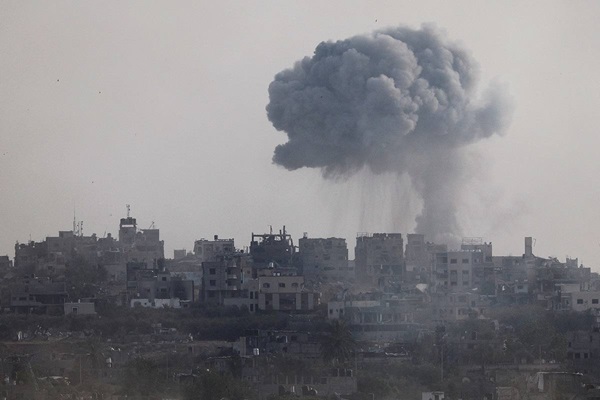Thirteen people, including a child, have died in an Israeli airstrike near the main government hospital in southern Beirut, according to the Lebanese health ministry.
The strike reportedly hit the parking lot of Rafik Hariri University Hospital, as confirmed by a hospital source to Reuters.
The health ministry also reported that 57 individuals were injured, with seven in critical condition.
This attack was part of a series of 13 airstrikes that targeted south Beirut on Monday evening. The Israeli military stated that it was striking facilities associated with Hezbollah.
An Israeli spokesperson had previously warned residents to evacuate several locations in southern Beirut, but Rafik Hariri Hospital was not included among those mentioned.
Videos from the Dahiyeh neighborhood, where seven pre-identified targets were struck, showed residents fleeing in vehicles and on foot as the attacks commenced.
One of the identified targets was approximately 400 meters from Beirut’s airport, Lebanon’s only international airport. Local media reported that some windows at the airport were shattered due to the blast.
Since issuing the evacuation warnings, Israel has not commented further.
Separately, the Israeli military stated earlier on Monday that it had discovered a Hezbollah bunker beneath a different hospital in southern Beirut, which has since been evacuated.
IDF spokesman Rear Admiral Daniel Hagari claimed, without providing evidence, that the bunker under Sahel Hospital in Haret Hreik contained hundreds of millions of dollars in cash and gold used to finance Hezbollah’s operations against Israel.
The director of Sahel Hospital denied the existence of a bunker underneath it and urged the Lebanese army to investigate the site.
Israel appears to be expanding its military efforts against Hezbollah beyond military infrastructure, now targeting the group’s financial networks.
On Sunday night, Israel conducted airstrikes on branches of a financial association linked to Hezbollah in southern Beirut’s suburbs, as well as in the south and east of the country.
The Israeli military stated that it targeted funds held by the Al-Qard Al-Hassan Association (AQAH), which provides financial services to civilians in regions where Hezbollah has significant support. However, both Israel and the U.S. accuse AQAH of serving as a cover for the Iran-backed group to finance its operations.
There was no immediate response from AQAH or Hezbollah regarding the military’s claims.
On the same day, U.S. President Joe Biden’s special envoy to the Middle East, Amos Hochstein, arrived in Beirut to discuss the possibility of negotiating an end to the conflict. Hochstein expressed that the U.S. wants to see an end to the war in Lebanon “as soon as possible.” He added that UN resolution 1701, which calls for the Lebanese state to be the only armed force in southern Lebanon, was “not enough,” and the U.S. is examining what further actions need to be taken.
Meanwhile, Hezbollah fighters continued to launch rockets into northern Israel, with military reports indicating that 170 projectiles had crossed the border by late Monday evening.
Israel initiated a significant air campaign and ground invasion against Hezbollah following nearly a year of cross-border skirmishes triggered by the war in Gaza, stating the aim was to ensure the safe return of tens of thousands of residents from Israeli border areas who were displaced due to rocket attacks.
Hezbollah began firing rockets into northern Israel on October 8, 2023, the day after its ally Hamas conducted a deadly attack on Israel.
Since the outbreak of violence, more than 2,400 people have died in Lebanon, including 1,800 in the past five weeks, according to the country’s health ministry. In northern Israel and the occupied Golan Heights, Israeli authorities report that 59 people have been killed.



